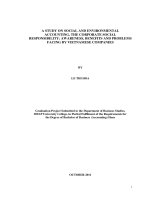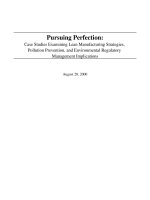Corporate Manufacturing and Environmental
Bạn đang xem bản rút gọn của tài liệu. Xem và tải ngay bản đầy đủ của tài liệu tại đây (819.5 KB, 3 trang )
Corporate Manufacturing and
Environmental Management:
Outline
Examples of Industry‐Academia‐Government
Alliances, and Collaboration with NPOs
1. Environmental management at the Asahi
Kasei Group
2. Examples of cooperation between industry,
academia,
d i andd governmentt
October 6, 2012
2-1. Successful examples
2-2. Promising future examples
Yoshihiko Nagasato, Ph.D.
Counsellor, Asahi Research Center
Chairman, Sub-Committee
on Industry-Academia-Government Cooperation,
Committee on Industrial Technology, Keidanren
3. Conclusion
2
World Events and Asahi Kasei Group Developments
Business Development Meeting the Needs of the Times
Worldwide
Japan
Asahi Kasei Group
1905–
Spread of electric
power
•Hydroelectric
Founding
generation
phase
•Ammonia production
(using hydropower)
1950–
Rachel Carson’s
Silent Spring (1962)
•Cadmium
poisoning (Toyama)
•Mercury poisoning
(Minamata)
•Asthma ((Yokkaichi))
Ion-exchange
membrane (chloralkali without
mercury)
Development
phase
1970–
•Club of Rome’s The
Limits to Growth
(1972)
•Rhine River pollution
•Oil shocks
•Photochemical
smog
•Development and
spread of energy
conservation
technology
•Hebel Haus™
•Neoma™ foam
(energy conserving
products)
Development
phase
1990–
•Earth Summit in Rio
de Janeiro (1992)
•Johannesburg
Declaration (2002)
Enactment of Basic
Environment Act
Microza™ (product
protecting water
quality)
Stable
growth
phase
4
3
Improving Water Quality
Contributing to the Development of a Recycling‐oriented Society
~ aiming for zero emissions ~
Microza™ microfiltration for large-scale water treatment
Reducing waste for final disposal (landfill) by recycling and reuse
Removing pathogenic protozoa and
particles by passing feed water
through hollow-fiber membranes
•Purifying municipal and
industrial wastewater, recycling
water
•Securing safe drinking water
(removing Cryptosporidium etc.)
5
Approximately 50% share in US
membrane water treatment technology
6
Application of Materials and Devices for the Environment
Harmony with the Environment in Housing Business
Home (product)
Utilization of
natural energy
Other
Homes with solar/fuel-cell
power generation
Environmental manufacturing
•Reducing unit energy
consumption
•Reducing waste
Homes with geothermal
heating/cooling system
Homes with rooftop gardens,
l f
leaf-covered
d walls
ll
Reducing the
environmental
footprint
•High-efficiency heat-pump
water heaters
•Home-use fuel-cell system
•Improved thermal insulation
performance (Neoma™ foam)
Environmental distribution
•Resource circulation
center (separation and
recycling)
Environmental construction
•Return and reuse of
packaging materials
•Recycling of panel
trimmings
7
8
New Environmental Cities for an Aging Society
City Hall
Cinema
P
Outline
Concert hall
1. Environmental management at the Asahi
Kasei Group
2. Examples of cooperation between industry,
academia,
d i andd governmentt
Bank
Waste treatment
facilities
City with ring-shaped light rail
Concentrating services for residents
Distributed power generation (fuel cells,
gas turbines,
t bi
etc.)
t )
Shopping center
Smart grid
2-1. Successful examples
2-2. Promising future examples
Zero emissions
Power supply centers
Restaurant
P
Interchange of
electricity and heat
3. Conclusion
School
Hospital
Hotel
Retirement home
Solar panels,
fuel cells
9
10
from AIST
2‐1. Successful examples
Insulating Resign with Electric Insulation
Performance and Flexibility
Outline
“8th Industry‐Academia‐Government Collaboration Contribution Award” (2010)
Kazuhiko SATO
Principal Research Scientist
Research Institute for Innovation in Sustainable Chemistry,
National Institute of Advanced Science and Technology (AIST)
Hiromichi SHIMADA
Deputy Director
National Institute of Advanced Science and Technology (AIST)
Hiroshi UCHIDA
Corporate Fellow
Showa Denko K. K. (SDK)
Outline
Kazuhiko SATO
¾Design of catalysts suitable for selective oxidation reactions with hydrogen peroxide.
¾Development of organic solvent- and halogen-free epoxidation process.
Hiromichi SHIMADA
¾Direction of AIST R&D team and SDK as a project leader.
¾Acceleration of R&D by the suitable measure.
Hi hi UCHIDA
Hiroshi
¾Design of a novel hardening agent
¾Complete development of the resist combined with the epoxy compound.
Results
Some products including the insulating resign.
There is a problem of the long-term performance degradation for the
conventional epoxy resigns, because of the organic chloride impurities
contaminated during the manufacturing process. SDK and AIST developed
under close collaboration a novel epoxy compound and hardening agent by
using hydrogen peroxide oxidation technology, which generate only water
as a by-product and can be carried out without any chlorine-based solvent
or chemicals. As a result, created epoxy resigns showed high flexibility and
long-term stability. Furthermore, it had more than 100 times higher
electrical resistance than the traditional ones. Thus this new resign is
expected to contribute to the compact, high-performance, and long-lived
electronics products.
11
1. Environmental management at the Asahi
Kasei Group
2. Examples of cooperation between industry,
academia,
d i andd governmentt
2-1. Successful examples
2-2. Promising future examples
3. Conclusion
12
from COCN
2‐2. Promising future examples
Biofuels from Microalgae
• Jointly established an open innovation research association
• Developing full-scale production technologies
Process
Raw material
production
Harvesting,
transportation,
and storage
Enzyme
saccharification
Pretreatment
Yeast
fermentation
• COCN "Development of Biofuels from Microalgae" Project in progress
• Establishing technology roadmap to achieve full-scale production process
Concentration
and dehydration
Culture
Cellulose
(acts as main
reinforcement)
Ethanol
Open pond
reinforcement)
Large-scale, highLargehighefficiency plant
material production
Low -cost
Lowenzyme
High--efficiency
High
pretreatment
saccharification
High--efficiency
High
fermentation
Concentration
and dehydration
energy reduction
Bio reactor
Toyota, Kajima, JX NOE
Oils and
fats
Micro
algae
l
Anhydrous
ethanol
(C6 sugar)
Difficult-to-ferment
Issues
Fuel
production
Extraction of
oils and fats
Condensation/dryness
Culture
fl id
fluid
Easy-to-ferment
sugar
sugar
Energy-source plants Lignin
Hemicellulose
Non-arable land
(grass, wood fiber)(acts like cement) (acts as supplementary
(C5 sugar)
Harvesting,
transportation, and
storage cost
reduction
from COCN
2‐2. Promising future examples
Bioethanol from Cellulosic Materials
JX NOE, Mitsubishi, Toray
JX NOE, Sapporo
(Dried)
Extraction
Centrifugal Dryness
condensation
Algae volume In
culture
fluid(ex.): 0.1%
Oils and fats
volume in dried
algae(ex): 30%
Refining
Extraction residue
Issues
The University of Tokyo
Agriculture, forestry and fisheries-related research institutions
Joint
research
Selection of Micro Algae,
High-efficiency Cultivation
High-
Low Energy
Condensation and
dry method
Low Energy
extraction method,
effective use of extraction residue
Process
Optimization
14
13
Tsukuba Innovation Arena
for Nanotechnology (TIA‐nano)
Technologies to Solve Environment and Energy Problems
3 Core
Infrastructure
N-MEMS
Nano-Green
Carbon Nanotubes
Nano-Material Safety
Solar thermal
Power generation
Fuel Cell
Heat resistance
materials
Insulation/
Radiation
materials
Fundamental materials
Rare metal
free
(Platinum etc.)
Rare earth free
(Dy etc.)
Nanodevice Research Foundry
Nanotech Open User Facilities
Hydrogen
Thermoelectric
Conversion
Thermal
power
generation
Power Electronics
Fuel
Networking School of
Nanotechnology
15
Mine
Environmental
Catalyst
Next generation
Power transmission
TThermal Energy
Artificial
photosynthesis
Solar light
Nanoelectronics
Secondary
Battery
electrolysis
Electric Energy
Photovoltaics
Global Center for Nanotechnology Research Base
formed by AIST・NIMS・Tsukuba Univ. ,
with support from Keidanren
6 Core
Research
Domains
from NIMS
2‐2. Promising future examples
2‐2. Promising future examples
Fuel cell bus
Fuel cell bus
Safe battery
EV/HV
Local power
transmission
Green Building
matters/
materials/
resources
EV/HV
Magnet
16
3. Conclusion
Evolution of Corporate Manufacturing and
Environmental Management
Outline
1. Environmental management at the Asahi
Kasei Group
2. Examples of cooperation between industry,
academia,
d i andd governmentt
Solution driven R&D requires diverse knowledge
Strengthening R&D for environmental technology
is a national issue
2-1. Successful examples
2-2. Promising future examples
3. Conclusion
Industry‐University‐Government Cooperation
is the Key
17
18









